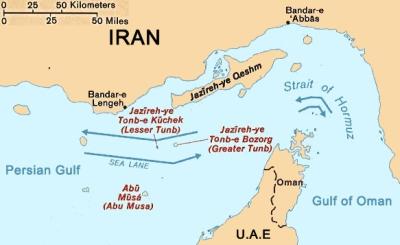Greater Tunb, Lesser Tunb and Abu Musa are an Inseparable Part of Iranian Territory!

October 9, 2025
The ideological and adventurous foreign policy of the Islamic Republic has weakened our country's position in the region and the world and has encouraged some countries to exploit the differences between Iran and its neighbors in order to pressure the regime and gain economic and political privileges. The recent statement by the member states of the Persian Gulf Cooperation Council and the European Union is the latest example of this. The statement by the European Union and the Persian Gulf Cooperation Council, which ignores Iran's historical and legal sovereignty over the islands of Greater Tunb, Lesser Tunb and Abu Musa, is a clear political interference that contradicts the historical realities of the region. Repetition of these positions in various statements can lead to an escalation of distrust, the spread of tension and the weakening of peace and stability in the region. What has given rise to such interventions and incorrect positions today is the failure of the tense and unwise policies of the Islamic Republic, which give other countries the opportunity to exploit the weakened position of the regime.
The deployment of Iranian forces on the three islands in November 1971, after the British government withdrew from the Persian Gulf and ended its occupation of these three islands, was in fact the restoration of Iran’s sovereignty over these islands. None of the Iranian governments had recognized the occupation of these islands by the British government, so it was natural for the government at the time to take action to exercise sovereignty over these islands after the occupation was lifted. At the same time, the deployment in the Greater and Lesser Tunb was carried out through negotiations between Britain and Iran, although without the exchange of written documents; however, in the case of Abu Musa, it was carried out by signing a memorandum of understanding between Iran and Sharjah. This memorandum, drafted by the British government, referred to the resolution of disputes between Iran and Sharjah through negotiations. Despite some legal ambiguities in the memorandum, which does not mention Iran’s long-standing sovereignty over the islands before their occupation by Britain, it does not negate Iran’s sovereignty either. The memorandum has confirmed the deployment of Iranian forces on the islands. When Iran advanced negotiations to restore its sovereignty over the islands and eventually settled there, there was no state called the United Arab Emirates that could later claim ownership of the three islands occupied by Britain.
With its tense and irresponsible behavior, the Islamic Republic has plunged Iran into political isolation and created a situation that powers can play with and manipulate in regional and international equations. The recent joint statement by the European Union and the Persian Gulf Cooperation Council and the re-proposition of a baseless territorial claim to the three islands of Greater Tunb, Lesser Tunb, and Abu Musa are clear signs of this situation. These positions are not based on international law, but on political goals and geopolitical rivalries.
The Left Party of Iran considers the UAE’s territorial claim to the Greater Tunb, Lesser Tunb, and Abu Musa islands to be unjustified and without legal basis; these islands are an inseparable part of Iran and emphasizes our country’s inalienable right to maintain its territorial integrity. At the same time, we believe that resolving any dispute between Iran and its neighbors through bilateral dialogue and based on mutual respect is in the common interests of the people of the region. Iran belongs to the Iranian people. Any attempt by other countries to politically exploit the weakness of the Islamic Republic against the national interests of the Iranian people is rejected and doomed to failure.
Political-Executive Board of the Left Party of Iran
October 24, 2025
